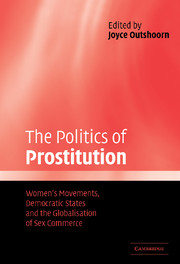 The Politics of Prostitution
The Politics of Prostitution Book contents
- Frontmatter
- Contents
- List of figures
- List of tables
- Notes on contributors
- Preface
- 1 Introduction: prostitution, women's movements and democratic politics
- 2 The women's movement and prostitution politics in Australia
- 3 Taxes, rights and regimentation: discourses on prostitution in Austria
- 4 Prostitution policies in Britain, 1982–2002
- 5 Prostitution as public nuisance: prostitution policy in Canada
- 6 Towards a new prohibitionism? State feminism, women's movements and prostitution policies in Finland
- 7 Prostitute movements face elite apathy and gender-biased universalism in France
- 8 The politics of prostitution and trafficking of women in Israel
- 9 Italy: the never-ending debate
- 10 Voluntary and forced prostitution: the ‘realistic approach’ of the Netherlands
- 11 State feminism and central state debates on prostitution in post-authoritarian Spain
- 12 Criminalising the john – a Swedish gender model?
- 13 The invisible issue: prostitution and trafficking of women and girls in the United States
- 14 Comparative prostitution politics and the case for state feminism
- Appendix 1 Independent variable indicators
- Appendix 2 Worksheets
- References
- Index
1 - Introduction: prostitution, women's movements and democratic politics
Published online by Cambridge University Press: 22 September 2009
- Frontmatter
- Contents
- List of figures
- List of tables
- Notes on contributors
- Preface
- 1 Introduction: prostitution, women's movements and democratic politics
- 2 The women's movement and prostitution politics in Australia
- 3 Taxes, rights and regimentation: discourses on prostitution in Austria
- 4 Prostitution policies in Britain, 1982–2002
- 5 Prostitution as public nuisance: prostitution policy in Canada
- 6 Towards a new prohibitionism? State feminism, women's movements and prostitution policies in Finland
- 7 Prostitute movements face elite apathy and gender-biased universalism in France
- 8 The politics of prostitution and trafficking of women in Israel
- 9 Italy: the never-ending debate
- 10 Voluntary and forced prostitution: the ‘realistic approach’ of the Netherlands
- 11 State feminism and central state debates on prostitution in post-authoritarian Spain
- 12 Criminalising the john – a Swedish gender model?
- 13 The invisible issue: prostitution and trafficking of women and girls in the United States
- 14 Comparative prostitution politics and the case for state feminism
- Appendix 1 Independent variable indicators
- Appendix 2 Worksheets
- References
- Index
Summary
How have women's movements challenged states over the past thirty years to deal with women's status and make them incorporate women as political actors? How have states responded to the challenge posed by the rise of the ‘second wave’ of feminism? Women's movement activists demanded state measures on a broad and diverse set of issues, ranging from equal representation in political decision-making and anti-discrimination measures on the labour market to the combat of sexual violence and the right to abortion. Governments responded by developing a varied set of ‘women's policy machineries’ (UN 1993), institutions to deal with such demands, ranging from temporary committees to full-fledged permanent departments within the national bureaucracy. The research described in this book addresses the role of these institutions in advancing the goals of women's movements in a number of post-industrial democracies. It focuses on one of the issues which re-emerged as a feminist concern, prostitution, and it sets out to answer the question of whether these institutions, here termed ‘women's policy agencies’, have been effective in dealing with the issue.
In this way the book raises the larger issue of whether governments have actually improved women's status, promoted women's rights and reduced gender-hierarchies that are at the basis of the inequalities between women and men.
- Type
- Chapter
- Information
- The Politics of ProstitutionWomen's Movements, Democratic States and the Globalisation of Sex Commerce, pp. 1 - 20Publisher: Cambridge University PressPrint publication year: 2004
- 10
- Cited by


